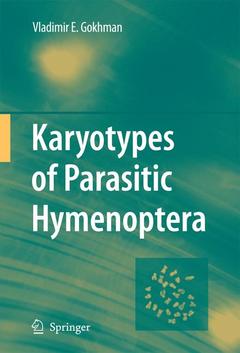Karyotypes of Parasitic Hymenoptera, Softcover reprint of the original 1st ed. 2009
Auteur : Gokhman Vladimir E.

Dr. Vladimir E. Gokhman is a leading researcher and the head of the Plant Protection Group of the Botanical Garden of Moscow State University, Moscow, Russia. He works at the Botanical Garden since 1983, after graduating with honour from the MSU Department of Entomology. Dr. Gokhman’s main research interests are karyology and systematics of parasitic wasps. He has defended a PhD ("Karyology and systematics of the subfamily Ichneumoninae (Hymenoptera, Ichneumonidae"; Moscow State University, 1990) and a Doctor of Science (DSc) thesis ("Karyotypes of parasitic Hymenoptera: their evolution and implications for systematics and phylogeny"; Zoological Institute of the Russian Academy of Sciences, 2003). Dr. Gokhman is a member of the editorial board of the Russian Entomological Journal and also a member of the International Society of Hymenopterists and the Russian Entomological Society.
The first monograph dedicated to the study of karyotype structure and chromosomal evolution of parasitic Hymenoptera
The author had elaborated a particular technique for obtaining chromosomal preparations from adult parasitic wasps that allowed including a wide range of those insects into the karyotypic study
Data on chromosome sets of about 400 species of parasitic Hymenoptera (including more than 200 micrographs) as well as comprehensive phylogenetic and taxonomic analyses of karyotypic information make the monograph an indispensable book for those interested in the taxonomy and genetics of the group
Date de parution : 08-2016
Ouvrage de 183 p.
15.5x23.5 cm
Disponible chez l'éditeur (délai d'approvisionnement : 15 jours).
Prix indicatif 158,24 €
Ajouter au panierDate de parution : 03-2009
Ouvrage de 183 p.
15.5x23.5 cm
Thèmes de Karyotypes of Parasitic Hymenoptera :
Mots-clés :
Chromosomes; Hymenoptera; Karyotypes; Parasitic wasps; chromosome; evolution; insect; Entomology



